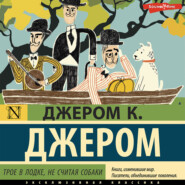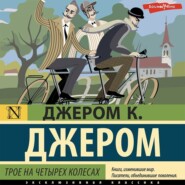По всем вопросам обращайтесь на: info@litportal.ru
(©) 2003-2024.
✖
The Second Thoughts of an Idle Fellow
Настройки чтения
Размер шрифта
Высота строк
Поля
But Nature, looking graver, lays her hand upon his arm.
“Put by your purse, boy,” she says, “my price is not a price in reason, nor is gold the metal that I deal in. There are many shops in various streets where your bank-notes will be accepted. But if you will take an old woman’s advice, you will not go to them. The thing they will sell you will bring sorrow and do evil to you. It is cheap enough, but, like all things cheap, it is not worth the buying. No man purchases it, only the fool.”
“And what is the cost of the thing you sell then?” asks the lad.
“Self-forgetfulness, tenderness, strength,” answers the old Dame; “the love of all things that are of good repute, the hate of all things evil – courage, sympathy, self-respect, these things purchase love. Put by your purse, lad, it will serve you in other ways, but it will not buy for you the goods upon my shelves.”
“Then am I no better off than the poor man?” demands the lad.
“I know not wealth or poverty as you understand it,” answers Nature. “Here I exchange realities only for realities. You ask for my treasures, I ask for your brain and heart in exchange – yours, boy, not your father’s, not another’s.”
“And this price,” he argues, “how shall I obtain it?”
“Go about the world,” replies the great Lady. “Labour, suffer, help. Come back to me when you have earned your wages, and according to how much you bring me so we will do business.”
Is real wealth so unevenly distributed as we think? Is not Fate the true Socialist? Who is the rich man, who the poor? Do we know? Does even the man himself know? Are we not striving for the shadow, missing the substance? Take life at its highest; which was the happier man, rich Solomon or poor Socrates? Solomon seems to have had most things that most men most desire – maybe too much of some for his own comfort. Socrates had little beyond what he carried about with him, but that was a good deal. According to our scales, Solomon should have been one of the happiest men that ever lived, Socrates one of the most wretched. But was it so?
Or taking life at its lowest, with pleasure its only goal. Is my lord Tom Noddy, in the stalls, so very much jollier than ’Arry in the gallery? Were beer ten shillings the bottle, and champagne fourpence a quart, which, think you, we should clamour for? If every West End Club had its skittle alley, and billiards could only be played in East End pubs, which game, my lord, would you select? Is the air of Berkeley Square so much more joy-giving than the atmosphere of Seven Dials? I find myself a piquancy in the air of Seven Dials, missing from Berkeley Square. Is there so vast a difference between horse-hair and straw, when you are tired? Is happiness multiplied by the number of rooms in one’s house? Are Lady Ermintrude’s lips so very much sweeter than Sally’s of the Alley? What is success in life?
ON THE PLAYING OF MARCHES AT THE FUNERALS OF MARIONETTES
He began the day badly. He took me out and lost me. It would be so much better, would he consent to the usual arrangement, and allow me to take him out. I am far the abler leader: I say it without conceit. I am older than he is, and I am less excitable. I do not stop and talk with every person I meet, and then forget where I am. I do less to distract myself: I rarely fight, I never feel I want to run after cats, I take but little pleasure in frightening children. I have nothing to think about but the walk, and the getting home again. If, as I say, he would give up taking me out, and let me take him out, there would be less trouble all round. But into this I have never been able to persuade him.
He had mislaid me once or twice, but in Sloane Square he lost me entirely. When he loses me, he stands and barks for me. If only he would remain where he first barked, I might find my way to him; but, before I can cross the road, he is barking half-way down the next street. I am not so young as I was and I sometimes think he exercises me more than is good for me. I could see him from where I was standing in the King’s Road. Evidently he was most indignant. I was too far off to distinguish the barks, but I could guess what he was saying —
“Damn that man, he’s off again.”
He made inquiries of a passing dog —
“You haven’t smelt my man about anywhere, have you?”
(A dog, of course, would never speak of seeing anybody or anything, smell being his leading sense. Reaching the top of a hill, he would say to his companion – “Lovely smell from here, I always think; I could sit and sniff here all the afternoon.” Or, proposing a walk, he would say – “I like the road by the canal, don’t you? There’s something interesting to catch your nose at every turn.”)
“No, I haven’t smelt any man in particular,” answered the other dog. “What sort of a smelling man is yours?”
“Oh, an egg-and-bacony sort of a man, with a dash of soap about him.”
“That’s nothing to go by,” retorted the other; “most men would answer to that description, this time of the morning. Where were you when you last noticed him?”
At this moment he caught sight of me, and came up, pleased to find me, but vexed with me for having got lost.
“Oh, here you are,” he barked; “didn’t you see me go round the corner? Do keep closer. Bothered if half my time isn’t taken up, finding you and losing you again.”
The incident appeared to have made him bad-tempered; he was just in the humour for a row of any sort. At the top of Sloane Street a stout military-looking gentleman started running after the Chelsea bus. With a “Hooroo” William Smith was after him. Had the old gentleman taken no notice, all would have been well. A butcher boy, driving just behind, would – I could read it in his eye – have caught Smith a flick as he darted into the road, which would have served him right; the old gentleman would have captured his bus; and the affair would have been ended. Unfortunately, he was that type of retired military man all gout and curry and no sense. He stopped to swear at the dog. That, of course, was what Smith wanted. It is not often he gets a scrimmage with a full-grown man. “They’re a poor-spirited lot, most of them,” he thinks; “they won’t even answer you back. I like a man who shows a bit of pluck.” He was frenzied with delight at his success. He flew round his victim, weaving whooping circles and curves that paralyzed the old gentleman as though they had been the mystic figures of a Merlin. The colonel clubbed his umbrella, and attempted to defend himself. I called to the dog, I gave good advice to the colonel (I judged him to be a colonel; the louder he spoke, the less one could understand him), but both were too excited to listen to me. A sympathetic bus driver leaned over, and whispered hoarse counsel.
“Ketch ’im by the tail, sir,” he advised the old gentleman; “don’t you be afraid of him; you ketch ’im firmly by the tail.”
A milkman, on the other hand, sought rather to encourage Smith, shouting as he passed —
“Good dog, kill him!”
A child, brained within an inch by the old gentleman’s umbrella, began to cry. The nurse told the old gentleman he was a fool – a remark which struck me as singularly apt The old gentleman gasped back that perambulators were illegal on the pavement; and, between his exercises, inquired after myself. A crowd began to collect; and a policeman strolled up.
It was not the right thing: I do not defend myself; but, at this point, the temptation came to me to desert William Smith. He likes a street row, I don’t. These things are matters of temperament. I have also noticed that he has the happy instinct of knowing when to disappear from a crisis, and the ability to do so; mysteriously turning up, quarter of a mile off, clad in a peaceful and pre-occupied air, and to all appearances another and a better dog.
Consoling myself with the reflection that I could be of no practical assistance to him and remembering with some satisfaction that, by a fortunate accident, he was without his collar, which bears my name and address, I slipped round the off side of a Vauxhall bus, making no attempt at ostentation, and worked my way home through Lowndes Square and the Park.
Five minutes after I had sat down to lunch, he flung open the dining-room door, and marched in. It is his customary “entrance.” In a previous state of existence, his soul was probably that of an Actor-Manager.
From his exuberant self-satisfaction, I was inclined to think he must have succeeded in following the milkman’s advice; at all events, I have not seen the colonel since. His bad temper had disappeared, but his “uppishness” had, if possible, increased. Previous to his return, I had given The O’Shannon a biscuit. The O’Shannon had been insulted; he did not want a dog biscuit; if he could not have a grilled kidney he did not want anything. He had thrown the biscuit on the floor. Smith saw it and made for it. Now Smith never eats biscuits. I give him one occasionally, and he at once proceeds to hide it. He is a thrifty dog; he thinks of the future. “You never know what may happen,” he says; “suppose the Guv’nor dies, or goes mad, or bankrupt, I may be glad even of this biscuit; I’ll put it under the door-mat – no, I won’t, somebody will find it there. I’ll scratch a hole in the tennis lawn, and bury it there. That’s a good idea; perhaps it’ll grow!” Once I caught him hiding it in my study, behind the shelf devoted to my own books. It offended me, his doing that; the argument was so palpable. Generally, wherever he hides it somebody finds it. We find it under our pillows – inside our boots; no place seems safe. This time he had said to himself – “By Jove! a whole row of the Guv’nor’s books. Nobody will ever want to take these out; I’ll hide it here.” One feels a thing like that from one’s own dog.
But The O’Shannon’s biscuit was another matter. Honesty is the best policy; but dishonesty is the better fun. He made a dash for it, and commenced to devour it greedily; you might have thought he had not tasted food for a week.
The indignation of The O’Shannon was a sight for the gods. He has the good-nature of his race: had Smith asked him for the biscuit he would probably have given it to him; it was the insult – the immorality of the proceeding, that maddened The O’Shannon.
For a moment he was paralyzed.
“Well, of all the – Did ye see that now?” he said to me with his eyes. Then he made a rush and snatched the biscuit out of Smith’s very jaws. “Ye onprincipled black Saxon thief,” growled The O’Shannon; “how dare ye take my biscuit?”
“You miserable Irish cur,” growled Smith; “how was I to know it was your biscuit? Does everything on the floor belong to you? Perhaps you think I belong to you, I’m on the floor. I don’t believe it is your biscuit, you long-eared, snubbed-nosed bog-trotter; give it me back.”
“I don’t require any of your argument, you flop-eared son of a tramp with half a tail,” replied The O’Shannon. “You come and take it, if you think you are dog enough.”
He did think he was dog enough. He is half the size of The O’Shannon, but such considerations weigh not with him. His argument is, if a dog is too big for you to fight the whole of him, take a bit of him and fight that. He generally gets licked, but what is left of him invariably swaggers about afterwards under the impression it is the victor. When he is dead, he will say to himself, as he settles himself in his grave – “Well, I flatter myself I’ve laid out that old world at last. It won’t trouble me any more, I’m thinking.”
On this occasion, I took a hand in the fight. It becomes necessary at intervals to remind Master Smith that the man, as the useful and faithful friend of dog, has his rights. I deemed such interval had arrived. He flung himself on to the sofa, muttering. It sounded like – “Wish I’d never got up this morning. Nobody understands me.”
Nothing, however, sobers him for long. Half-an-hour later, he was killing the next-door cat. He will never learn sense; he has been killing that cat for the last three months. Why the next morning his nose is invariably twice its natural size, while for the next week he can see objects on one side of his head only, he never seems to grasp; I suppose he attributes it to change in the weather.
He ended up the afternoon with what he no doubt regarded as a complete and satisfying success. Dorothea had invited a lady to take tea with her that day. I heard the sound of laughter, and, being near the nursery, I looked in to see what was the joke. Smith was worrying a doll. I have rarely seen a more worried-looking doll. Its head was off, and its sawdust strewed the floor. Both the children were crowing with delight; Dorothea, in particular, was in an ecstasy of amusement.
“Whose doll is it?” I asked.
“Eva’s,” answered Dorothea, between her peals of laughter.
“Oh no, it isn’t,” explained Eva, in a tone of sweet content; “here’s my doll.” She had been sitting on it, and now drew it forth, warm but whole. “That’s Dorry’s doll.”
The change from joy to grief on the part of Dorothea was distinctly dramatic. Even Smith, accustomed to storm, was nonplussed at the suddenness of the attack upon him.
Dorothea’s sorrow lasted longer than I had expected. I promised her another doll. But it seemed she did not want another; that was the only doll she would ever care for so long as life lasted; no other doll could ever take its place; no other doll would be to her what that doll had been. These little people are so absurd: as if it could matter whether you loved one doll or another, when all are so much alike! They have curly hair, and pink-and-white complexions, big eyes that open and shut, a little red mouth, two little hands. Yet these foolish little people! they will love one, while another they will not look upon. I find the best plan is not to reason with them, but to sympathize. Later on – but not too soon – introduce to them another doll. They will not care for it at first, but in time they will come to take an interest in it. Of course, it cannot make them forget the first doll; no doll ever born in Lowther Arcadia could be as that, but still – It is many weeks before they forget entirely the first love.
We buried Dolly in the country under the yew tree. A friend of mine who plays the fiddle came down on purpose to assist. We buried her in the hot spring sunshine, while the birds from shady nooks sang joyously of life and love. And our chief mourner cried real tears, just for all the world as though it were not the fate of dolls, sooner or later, to get broken – the little fragile things, made for an hour, to be dressed and kissed; then, paintless and stript, to be thrown aside on the nursery floor. Poor little dolls! I wonder do they take themselves seriously, not knowing the springs that stir their sawdust bosoms are but clockwork, not seeing the wires to which they dance? Poor little marionettes! do they talk together, I wonder, when the lights of the booth are out?
You, little sister doll, were the heroine. You lived in the white-washed cottage, all honeysuckle and clematis without – earwiggy and damp within, maybe. How pretty you always looked in your simple, neatly-fitting print dress. How good you were! How nobly you bore your poverty. How patient you were under your many wrongs. You never harboured an evil thought, a revengeful wish – never, little doll? Were there never moments when you longed to play the wicked woman’s part, live in a room with many doors, be-clad in furs and jewels, with lovers galore at your feet? In those long winter evenings? the household work is done – the greasy dishes washed, the floor scrubbed; the excellent child is asleep in the corner; the one-and-elevenpenny lamp sheds its dismal light on the darned table-cloth; you sit, busy at your coarse sewing, waiting for Hero Dick, knowing – guessing, at least, where he is – ! Yes, dear, I remember your fine speeches, when you told her, in stirring language the gallery cheered to the echo, what you thought of her and of such women as she; when, lifting your hand to heaven, you declared you were happier in your attic, working your fingers to the bone, than she in her gilded salon – I think “gilded salon” was the term, was it not? – furnished by sin. But speaking of yourself, weak little sister doll, not of your fine speeches, the gallery listening, did you not, in your secret heart, envy her? Did you never, before blowing out the one candle, stand for a minute in front of the cracked glass, and think to yourself that you, too, would look well in low-cut dresses from Paris, the diamonds flashing on your white smooth skin? Did you never, toiling home through the mud, bearing your bundle of needlework, feel bitter with the wages of virtue, as she splashed you, passing by in her carriage? Alone, over your cup of weak tea, did you never feel tempted to pay the price for champagne suppers, and gaiety, and admiration? Ah, yes, it is easy for folks who have had their good time, to prepare copybooks for weary little inkstained fingers, longing for play. The fine maxims sound such cant when we are in that mood, do they not? You, too, were young and handsome: did the author of the play think you were never hungry for the good things of life? Did he think that reading tracts to crotchety old women was joy to a full-blooded girl in her twenties? Why should she have all the love, and all the laughter? How fortunate that the villain, the Wicked Baronet, never opened the cottage door at that moment, eh, dear! He always came when you were strong, when you felt that you could denounce him, and scorn his temptations. Would that the villain came to all of us at such time; then we would all, perhaps, be heroes and heroines.
Ah well, it was only a play: it is over now. You and I, little tired dolls, lying here side by side, waiting to know our next part, we can look back and laugh. Where is she, this wicked dolly, that made such a stir on our tiny stage? Ah, here you are, Madam; I thought you could not be far; they have thrown us all into this corner together. But how changed you are, Dolly: your paint rubbed off, your golden hair worn to a wisp. No wonder; it was a trying part you had to play. How tired you must have grown of the glare and the glitter! And even hope was denied you. The peace you so longed for you knew you had lost the power to enjoy. Like the girl bewitched in the fairy tale, you knew you must dance ever faster and faster, with limbs growing palsied, with face growing ashen, and hair growing grey, till Death should come to release you; and your only prayer was he might come ere your dancing grew comic.
Like the smell of the roses to Nancy, hawking them through the hot streets, must the stifling atmosphere of love have been to you. The song of passion, how monotonous in your ears, sung now by the young and now by the old; now shouted, now whined, now shrieked; but ever the one strident tune. Do you remember when first you heard it? You dreamt it the morning hymn of Heaven. You came to think it the dance music of Hell, ground from a cracked hurdy-gurdy, lent out by the Devil on hire.

















